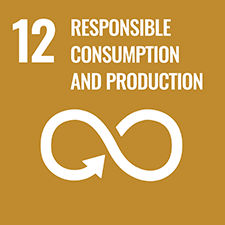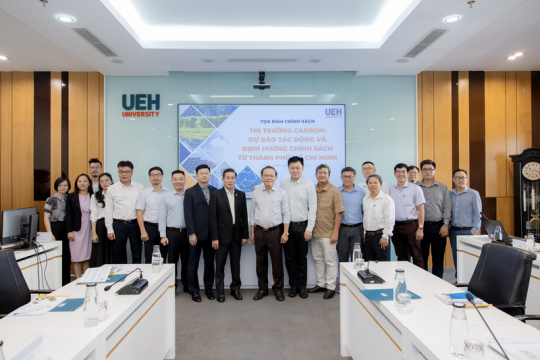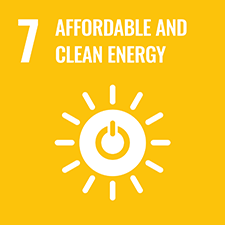
Sustainable Career Orientation 5.0 - Empowering Tomorrow: 'Choosing a career should be in accordance with the value of happiness'
12 Apr, 2024
The value of happiness in work was one of the important factors in choosing a major or profession before university, as remarked by experts at two career orientation seminars Empowering Tomorrow.
The program was organized by University of Economics Ho Chi Minh City (UEH) in collaboration with Truong Nguoi Ta fanpage. Empowering Tomorrow had the participation of Associate Professor, Bui Quang Hung - Deputy Director of UEH and Ms. Pham Thi Phuong Khanh - Marketing Director of Navigos Group Vietnam (owner of Vietnamworks).
The two experts analyzed for students the three "understandings" that need to be determined prior to choosing a career or university, including understanding yourself, understanding the market, and understanding how universities teach majors and professions. Based on them, parents, high school and middle school teachers could also receive a lot of information and solutions to accompany their children in the process of planning the future.

The first issue of Empowering Tomorrow has the participation of Associate Professor Bui Quang Hung - Deputy Director of UEH, Ms. Pham Thi Phuong Khanh - Marketing Director of Navigos Group Vietnam and MC Tuyen Tang (from the right)
In the first issue, the speakers delved into the topics of understanding yourself and the market. After many years of research, Ms. Pham Thi Phuong Khanh believed that each person should determine the value of happiness that work brought to them. In fact, many people had the same career development journey with three different levels.
The first level was to find a job, that is, simply to conquer a position that helps you cover your basic living expenses. This was the first need on the career journey.
After being able to satisfy the basic needs of life, people often thought about the career they wanted to pursue. Employees would ask a number of questions regarding how they developed, whether they made progress every day, what the promotion path was, and what was the percentage of income growth, etc.
Human resources would step to the final level after working for a long time. In accordance with the speaker, at this time, people would recognize the value of happiness in work (inner calling), that was, the meaning that work brought to them.
“For example, I love jobs that contribute to the community and society. Therefore, based on the fact that I want to help people around me develop their careers, I will see what jobs can bring that value. This is what will help you be happy," she analyzed.
The Marketing Director of Navigos Group Vietnam emphasized that it was necessary to introduce this concept into career orientation from the high school stage. Because, through observing the market, she noticed that there were many cases where, even though they had worked to a high-level position and gone through the first two levels, people did not feel happy and returned to comprehend what made them happy and decided to take a new path.
“If we have this right from the beginning, students will have a happy career journey earlier. That's why I introduce and pay attention to the concept of the value of happiness that work brings in young people's journey to 'understand themselves'," she added.

The two experts analyzing how to understand themselves, helping students choose a more suitable undergraduate major
However, to fully go through these three levels, students should start by understanding themselves. Associate Professor Bui Quang Hung commented that understanding abilities, strengths, and interests was very difficult because they could change over time. It was hard for a high school student to really get it right.
Tendencies, interests, and abilities would be accumulated through learning and working experiences and in association with the surrounding environment, requiring each individual to understand themselves. However, instead of going into details about what they like, what their abilities were, etc. students should approach both sides of an issue. For example, were you a rational or emotional person; did you like calculations or literature, creativity or systematic processes; were you a comprehensive or meticulous person, etc?
"Once determined them, you can accumulate knowledge, experience, and have the ability to change to face future career challenges," he shared.
Associate Professor. Bui Quang Hung emphasized the role of parents and teachers in this process. Those closest to students needed to understand and respect them instead of imposing choices according to their wishes.
However, the experts said that understanding ourselves was not enough. Students and parents should learn the market. In times of uncertainty, the rapidly changing world has eliminated some repetitive jobs, machines could replace humans, and at the same time, create many new careers.
Therefore, to adapt to uncertainties, young people needed to understand which jobs might disappear in the future or would become a trend. At the same time, they needed to choose a path that could help equip themselves with the skills to quickly adapt to changes.
“Lifelong learning, continuous accumulation of knowledge and the ability to self-study are the basic factors for us to see that changing the working environment and career is completely ordinary. A sustainable career occurs when individuals create happy values at work", Associate Professor Bui Quang Hung added.
In addition, the two speakers suggested other sustainable skills in the first issue of Empowering Tomorrow, thereby helping students open up the third "understanding": understanding the field of study and universities train in the 5.0 era.
In Empowering Tomorrow episode two, experts shared that the influence of technology on other professions in life is growing, requiring higher education institutions to innovate to keep pace with market trends, helping learners integrate faster.
Associate Professor Tran Ha Minh Quan stressed that if previous generations listed as Gen X or Y had the mindset of maintaining one job, Gen Alpha or the following generations are forecasted to have career paths that change at least once or twice into unrelated or closely related fields. That was why universities have strived to equip new generations of learners with multi-disciplinary knowledge to be ready for these transitions.

Two experts and Associate Professor Tran Ha Minh Quan - Director of Dean of International School of Business ISB, UEH (far left) in Empowering Tomorrow episode two
Associate Professor Bui Quang Hung stated that University of Economics Ho Chi Minh City was providing programs with three main criteria: skill sets meeting market needs; program design with multidisciplinary, interdisciplinary, and international content.
Currently, universities around the world in general, and UEH in particular, have all incorporated technology into their programs from economics listed as finance, accounting, business administration, etc. to social sciences. Recently, UEH launched the ArtTech program, the intersection of technology and art, to provide the labor market with potential human resources.
In addition to professional training, Ms. Phuong Khanh encouraged higher education institutions to equip students with the vision to forsee opportunities everywhere, instead of just large economic centers like Ho Chi Minh City or Hanoi. Localities also had a lot of development potential but always lacked high-quality human resources.
Currently, universities have also tended to expand to other areas, beyond major economic centers. Among them, University of Economics Ho Chi Minh City has Branches in Vinh Long and Nha Trang, and Vietnam National University has branches in Ben Tre. Therefore, young people could have more choices in their career development journey.
Students and parents could find more detailed analyses from experts on opportunities, career choices, and trending universities in the next issue of the Empowering Tomorrow seminar.
News and photos: Department of Marketing and Communication, VnExpress Newspaper










